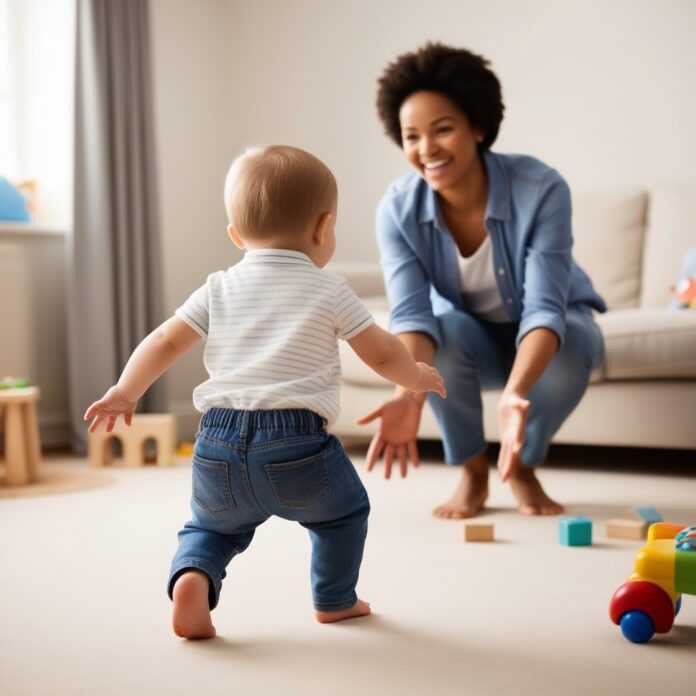Watching your toddler achieve his or her developmental milestones is one of the exciting parts of parenting. From taking those first steps to uttering the first words, each phase of development is full of new discoveries. In this paper, we shall look at some key toddler milestones that shall be useful in understanding what to expect as your child progresses through each stage. Remember, every toddler develops at his or her own pace; these milestones are thus used as a general guide.
Physical Development Milestones
Physical development includes the fine-tuning of motor skills such as walking, running, and jumping. Following are a few physical milestones you can expect to see in your toddler:
12-18 Months
- Self-walking: The first steps any toddler takes always fall between 12 and 18 months.
- Object grasping: Infants in this age bracket love picking up small objects like blocks and can use the pincer grasp.
- Climbing: A child may also begin climbing onto furniture at this stage, showing improvement in mobility.
18-24 Months
- Running: Most toddlers, by 18 months, can run though still a bit wobbly.
- Kicking a ball: Better coordination is developed in which your toddler may enjoy kicking the ball.
- Building towers: Your child will be able to stack blocks showing improved fine motor skills.
24-36 Months
- Jumping with both feet: By age 2, most toddlers are able to jump with both feet off the ground.
- Utensil use: Most toddlers at this stage can feed themselves both with a spoon and fork, which has made them independent.
- Pedaling tricycle: At about 3 years, they may pedal, which would make them display much coordination and strength.
2. Cognitive Developmental Milestones
Cognitive development refers to the thinking, learning, and problem-solving abilities in a toddler. Here is what to expect in terms of toddler milestones in cognitive development:
12-18 Months
- Imitation play: they just love to imitate everything grown-ups do from brushing hair to talking on a toy phone.
- Object recognition and naming: identifying and naming familiar objects like a ball or dog
- Following simple directions: at this stage, they can follow simple instructions for example, “come here.”
18-24 Months
- Play becomes more imaginative. For instance, your toddler might pretend to feed themselves or a doll, or talk on a toy phone.
- Body parts identification: They might point to the nose, eyes, and other body parts if pointed to.
- Shape and color sorting: They also start to enjoy sorting games, which is indicative of higher cognition
24-36 Months
- Puzzles: By age 3, they begin to complete simple puzzles; this reflects problem-solving abilities
- “Why” questions: Children at this age begin to ask questions starting with “why” and comprehend “why” questions, reflecting an interest in the world.
- Counting: They may commence to recognize numbers and frequently can count to 10 with some help.
3. Social and Emotional Development Milestones
Social-emotional development refers to the ways toddlers relate to others and express their feelings. Here is what one can expect from the social development of toddlers:
12-18 Months
- Display of affection: Several toddlers of this age show a lot of affection to the caretakers by hugging or cuddling.
- Separation anxiety: Many toddlers are; beginning to spend time apart from parents develops anxiety in them.
- Expressing their feelings: They become more expressive with their feelings, be it excitement, frustration, or even happiness.
18-24 Months
- Parallel play: Playing with other children; they would not necessarily play with the other kids; that is called parallel play.
- Noticing reflection: At this phase, they acknowledge themselves in mirrors, which helps with self-recognition.
- Refusal to share: They don’t share because social skills have yet to develop.
24-36 Months
- Playing with others: At around age 3, children begin to show cooperative play with other children.
- Showing empathy: Children at this stage begin to develop an understanding of others’ feelings and will often show empathy by attempting to soothe a friend.
- Expressing independence: They may insist on doing things independently as a sign of heightened independence.
4. Language Development Milestones
Among other noticeable toddler developmental milestones, the most incredible one is language development. Here’s what you may be able to expect as your child’s language skills blossom:
12-18 Months
- First words: Most toddlers say their first words, such as “mama” or “dada,” between 12 and 18 months.
- Gestures: They might also use gestures, such as waving or pointing, to communicate.
- Understand simple words: A toddler can understand simple commands like “no” or “stop.”
18-24 Months
- Vocabulary explosion: Many children start a sudden proliferation of learning new words daily.
- Combining words: Your child is capable of forming a two-word sentence, “want milk” or “big truck.”
- Naming familiar people: A toddler should be able to refer by name the immediate members and the pets.
24-36 Months
- Using sentences: A child is able to talk using short sentences containing three or more words in a sentence.
- Following instructions: They are able to understand and follow instructions that have a number of steps. For example, “pick up the toy and put it on the table.”
- Conversation: They start asking questions and carry on simple conversations.
Knowledge of the different milestones a toddler achieves will help one to track the child’s progress and see if he is on schedule according to the normal development chart. Remember that every child grows at his own pace, and reaching milestones can vary. Consult your pediatrician if any concern arises. Celebrate each and every milestone, and enjoy the journey with your little one.



